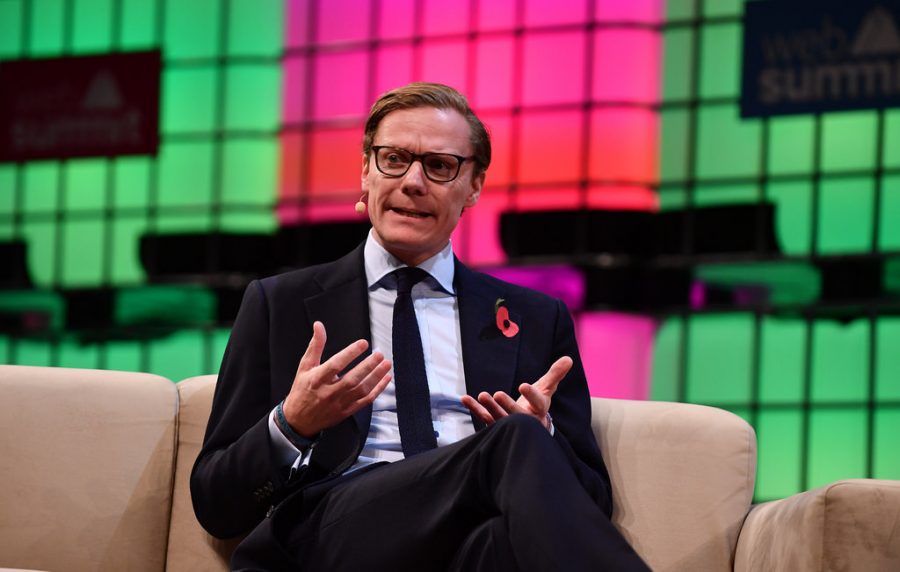Marketing, Cyber Security Professors Weigh in on Cambridge Analytica Scandal
Alexander Nix, CEO of Cambridge Analytica, speaking at Web Summit 2017 in Lisbon. Nix and Cambridge Analytica have come under controversy for unethical data mining and usage of as many as 50 million Facebook users
March 28, 2018
After five days of near-silence from on the Cambridge Analytica scandal that harvested data from millions of Facebook users, Mark Zuckerberg set out on an apology tour by sitting down for interviews with a number of news organizations last week including Wired, The New York Times and CNN.
Beginning in 2014, Cambridge Analytica used data captured from over 270,000 Facebook users through a personality quiz. Data was then accessed from friends lists, ultimately amassing information from over 50 million profiles.
Christopher Wylie, a former employee at Cambridge Analytica who left the company in 2014, blew the whistle on the unethical data usage earlier this month. The information gathered — including status updates, likes, location and sometimes even private messages — was sold to several political campaigns in 2016, including that of President Donald Trump.
With all of Cambridge Analytica’s lapses, NYU Tandon professor Justin Cappos, who works heavily in cyber security, warns against placing too much of the blame on the data firm, which he likened to a robber and Facebook to a glaringly insecure bank.
“Of course, what Cambridge Analytica did was bad but Facebook set up the rules and the system for how this was all supposed to happen,” Cappos said to WSN. “Facebook isn’t in the business of storing data secretly, they’re in the business of gathering information about you and selling it […] to make as much money as possible.”
NYU Stern Professor Scott Galloway criticized Mark Zuckerberg’s response to the recent Cambridge Analytica scandal in which data from millions of Facebook users was harvested from their profiles of Facebook.
Galloway authored “The Four” a book about the power Facebook, Amazon, Apple and Google have emassed and has built a reputation criticizing big tech companies, advocating for the breakup of these four big tech companies earlier this year.
“We’re in the midst of the textbook case study on how not to handle a crisis,” Stern School of Business Professor Galloway to CNBC last week. “When you’re the CEO of a company that assembled a community as vast as Christianity…you have an obligation to immediately address the issue.”
In an interview with CNN, Zuckerberg vowed to enact an audit on any apps that are improperly using data from Facebook and ensure that developers aren’t able to access as much information as Cambridge Analytica did. In addition, Zuckerberg told CNN that Facebook would build a tool where users can see if their data was used in the Cambridge Analytica data haul.
While Zuckerberg has agreed to testify before Congress, Galloway doesn’t envision the U.S. government handling this crisis alone.
“I don’t think [Washington] D.C. has the collective will or domain-expertise around technology to take on big tech right now,” Galloway said to CNBC. “The war against big tech is going to break out where all the major conflicts of the 20th century break out — in Europe.”
Channel 4, a British television network, sent reporters undercover as political consultants looking to secure a political campaign in Sri Lanka. During a pitch to the “consultants,” Chief Data Officer Dr. Alex Tayler was recorded boasting about Cambridge Analytica’s role in Donald Trump’s election.
“When you think about the fact that Donald Trump lost the popular vote by three million votes but won the electoral college vote, that’s down to the data and the research,” Tayler said in the recording.
Even with the changes Zuckerberg plans to deliver, Cappos expects that these will make Facebook only marginally more secure. He has serious reservations about Facebook that have steered him away from ever making a profile.
“There are serious consequences in the way that this system is designed,” Cappos said. “With the changes and the responses and everything, I would advise against trusting them with your data.”
Email Sunanda Gaskins at [email protected].



























































































































































